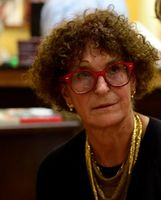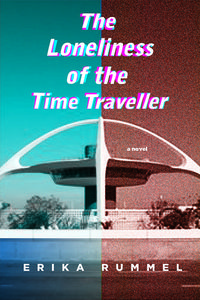Erika Rummel on Her Austen-Inspired New Time Slip Novel That Moves from London to LA
To say that there are a lot of time travel stories is an understatement, but one thing is often starkly missing from those tech- and adventure-focused tales: the social and emotional experience of what it would actually be like to move through time. In Erika Rummel's The Loneliness of the Time Traveller (Inanna Publications), Lynne, who lived and died in 18th century London and found herself given a second chance when she wickedly invades the body of Adele, manages to get herself to 21st century Los Angeles. But all is not well despite Lynne's achievement and her new life of ease: the process has left her emotionally flattened and longing for the passion of her long-lost first life. Now on the hunt for Adele's diary, her only chance to return, Lynne must face her choices and what she's done while deciding what it is she truly wants.
Smart, insightful, and with an eye firmly fixed on the social conventions, both fascinating and humorous, of each historical period, The Loneliness of the Time Traveller is an unexpected and out of the box but essential addition to the genre.
We're excited to speak with Erika today as part of our Long Story series for novelists. She tells us about how the writings of Jane Austen featured amongst her inspirations for the book, why L.A. was the perfect place for her to set the contemporary timeline, and what might be in store for Lynne next.
Open Book:
Do you remember how your first started this novel or the very first bit of writing you did for it?
Erika Rummel:
The Loneliness of the Time Traveller is a split time novel, but it didn’t start out that way. It began as a straightforward historical novel, set in 18th century London.
The inspiration was Austen, her wit, her irony, her amusing description of society’s foibles. My heroine, Adele, wrangles with the demands of the marriage market, the unpopularity of intelligent women, AND with Lynne, an unruly incubus who has invaded her mind and body and wants to have a say in everything she does.
So much for the 18th century story – I love writing historical novels, but I also want to comment on our own time. How can I do that without being anachronistic? The answer: by writing a split time novel. And so I made Lynne, the incubus, move on and body-snatch her way from 18th century London to 21st century L.A.
OB:
How did you choose the setting of your novel? What connection, if any, did you have to the setting when you began writing?
ER:
L.A. has become my second home. Twenty years ago I was invited to spend a year as a guest of the Getty Research Institute in L.A.. I fell in love with the city and have been spending winter semesters there ever since. Contrary to its reputation as La La Land, it’s a great place with something for everyone – beach bunnies, movie buffs, and academics alike.
In my novel Lynne is inhabiting the body of a doctoral student at UCLA. She is trying to get her hands on a rare manuscript, the essential tool to channel her next time travel adventure. The book is in the “Clarkson” – in real life, the Clark Memorial Library, where I spent many hours as a researcher. Not that I was trying to steal a manuscript, which is impossible with all the safeguards in place. Of course nothing is impossible in a novel. Lynne just has to work her charm on Sam, the custodian of the library. He knows the electronic code to unlock doors and, as luck would have it, is a professional thief.
Your CanLit News
Subscribe to Open Book’s newsletter to get local book events, literary content, writing tips, and more in your inbox
OB:
Did the ending of your novel change at all through your drafts? If so, how?
ER:
My novel originally ended with Lynne deciding to give up time travel because life in contemporary L.A. is good, but now I have other plans for her. The new ending has Lynne turning nostalgic for her first life. She decides to travel back to 18th century London. It’s a first for her. She has always moved forward. Can she reverse time?
Watch for The Loneliness of the Time Traveller: The Sequel. I’ll give you a hint: Lynne is back in 18th century London and hailed by an adoring public as the new star of Drury Lane.
OB:
Did you do any specific research for this novel? Tell us a bit about that process.
ER:
I wrote the 18th century story after I came across a bundle of manuscript letters written by a clergyman, Percival Stockdale (1736-1811). He also published a self-glorifying autobiography, which omits a lot that wasn’t to his credit. Reading his (unpublished) letters I found out what he was really like. I thought this old hypocrite would make a great character in my novel, but then imagination kicked in, and I gave him a rather more “interesting” life than the historical figure had. If the real Stockdale was alive today, he would no doubt sue me for libel.
OB:
Did you include an epigraph in your book? If so, how did you choose it and how does it relate to the narrative?
ER:
I included a postscript in which Lynne is enjoying herself in L.A., yet finds that something is missing in her life – passion. That’s the problem with moving from one body to the next, as she did for 200 years. Your emotions flatten out in the process. Lynne is nostalgic for the passion she felt for her first lover and ready to give up the luxuries of L.A. for her first life in London, when she was a poor serving girl in a disreputable alehouse. I leave her with the thought of returning to the 18th century, to a life of passion, but with all the knowledge she has acquired on her time-travels.
__________________________________________
Erika Rummel has taught history at the University of Toronto and Wilfrid Laurier University, Waterloo. She divides her time between Toronto and Los Angeles and has lived in villages in Argentina, Romania, and Bulgaria. She has published eight novels and more than a dozen books on social history of the Renaissance. A recipient of international fellowships and literary awards, she was honoured in 2018 with a lifetime achievement award by the Renaissance Society of America. www.erikarummel.com/





